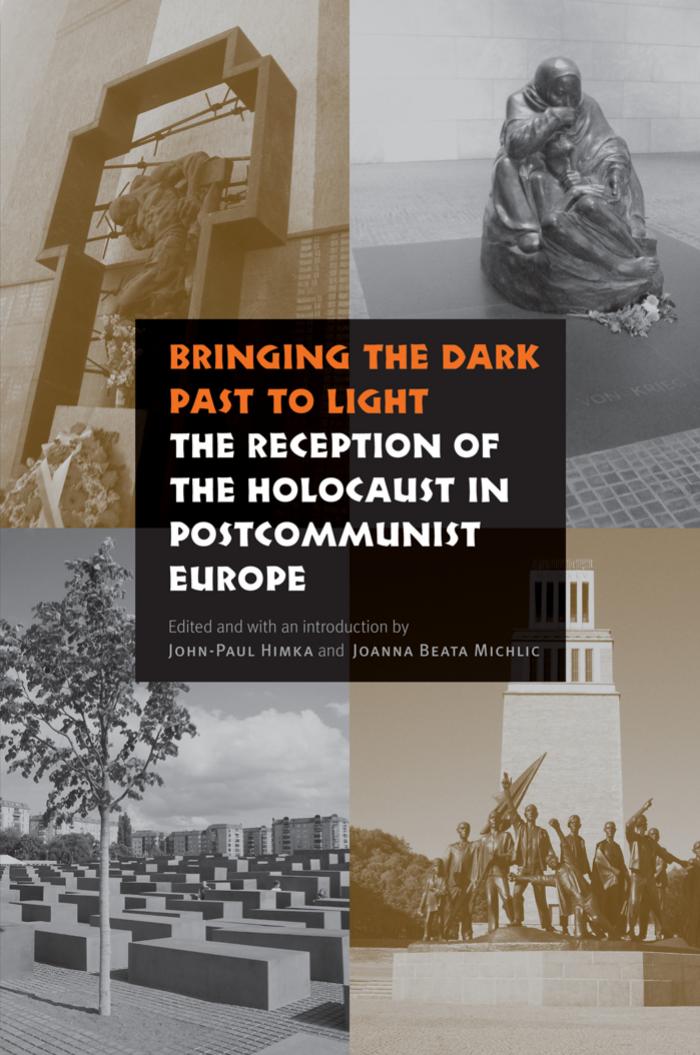Bringing the Dark Past to Light: The Reception of the Holocaust in Postcommunist Europe by John-Paul Himka Joanna Beata Michlic

Author:John-Paul Himka, Joanna Beata Michlic [Himka, John-Paul, Michlic, Joanna Beata]
Language: eng
Format: epub, pdf
ISBN: 9781496210203
Publisher: University of Nebraska Press
Published: 2018-03-06T16:00:00+00:00
14. The Memory of the Holocaust in Post-1989 Poland
Renewal—Its Accomplishments and Its Powerlessness
On 18 May 2009 the German weekly Der Spiegel published an article, “Hitlers europäische Helfer beim Judenmord,” which astutely discusses various official and nonofficial collaborators and voluntary perpetrators in the murder of six million Jews in Nazi-occupied Europe.1 The authors highlight the denunciations and bloody killings of Jews by members of local populations in wartime Latvia, Lithuania, Poland, and Romania, as well as the overzealously efficient methods used by local bureaucrats in tracing and shipping Jews to Auschwitz from Vichy France and the Netherlands. In the light of the magnitude of collaboration, the authors pose an important question about the Holocaust as a European project, while at the same time neither shifting the central responsibility for the Holocaust from Nazi Germany onto other European states, nor portraying the Germans as innocent victims; nor do they ignore the noble acts of rescuing Jews, like those that took place in German-occupied Poland.
This well-researched article outraged some mainstream political and journalistic circles in Poland. Right-wing conservative circles and individuals, including former prime minister Jarosław Kaczyński, chief journalists of the major center-right newspaper Rzeczpospolita and the right-wing Catholic Nasz Dziennik, and officials of the Instytut Pamie˛ci Narodowej (Institute of National Remembrance, IPN), all accused Der Spiegel of foisting guilt for the Nazi crimes off onto others, and announced that Germans had no right to refer to Hitler’s European helpers.2 Conversely, liberal politicians and journalists, including former Polish minister of foreign affairs Adam Daniel Rotfeld, himself a Holocaust survivor, and Marek Beylin of Gazeta Wyborcza, did not find anything in the article either contemptible or leading to relativization of German guilt.3
Yet the reactions toward the article in Der Spiegel not only reveal certain challenging aspects in current Polish-German relations with regard to the memory of the Second World War but also are symptomatic of the wide polarization of contemporary Polish memory of the destruction of Polish Jews. Two interviews published in Rzeczpospolita a week after the publication of the Der Spiegel article starkly reveal the clashing representations of the Holocaust with regard to Polish-Jewish relations before, during, and after the war. Alina Cała, senior scholar of the Jewish Historical Institute in Warsaw and author of the first interview, boldly refers to the painful and shameful past in modern Polish history: the acts of denunciation, prejudicial behavior, and mistreatment of Polish Jews by certain segments of Polish society during the war. She highlights the role of National Democracy,4 the core ethnonationalist and anti-Semitic political movement and party, and of the Catholic Church in disseminating aggressive anti-Jewish propaganda prior to the Second World War. She convincingly argues that such anti-Semitic propaganda was conducive to grave anti-Jewish actions under wartime conditions. Thus, Cała contends that in light of the Polish prewar anti-Semitic heritage and its subsequent wartime impact, Poles also have to bear some responsibility for the Holocaust.
The author of the second interview is a highly respected Polish historian, politician, and statesman, who, for his involvement
Download
Bringing the Dark Past to Light: The Reception of the Holocaust in Postcommunist Europe by John-Paul Himka Joanna Beata Michlic.pdf
This site does not store any files on its server. We only index and link to content provided by other sites. Please contact the content providers to delete copyright contents if any and email us, we'll remove relevant links or contents immediately.
| Africa | Americas |
| Arctic & Antarctica | Asia |
| Australia & Oceania | Europe |
| Middle East | Russia |
| United States | World |
| Ancient Civilizations | Military |
| Historical Study & Educational Resources |
A Tale of Love and Darkness by Amos Oz(1015)
Remember Us by Martin Small(964)
Aimee & Jaguar by Erica Fischer(955)
When Time Stopped by Ariana Neumann(952)
Alex's Wake by Martin Goldsmith(939)
The Betrayal of the Duchess by Maurice Samuels(915)
The Invention of the Jewish People by Shlomo Sand(830)
Genius & Anxiety by Norman Lebrecht(802)
A Chosen Few by Mark Kurlansky(781)
Roosevelt and the Holocaust by Robert L. Beir(710)
The Warburgs by Ron Chernow(699)
East West Street: On the Origins of "Genocide" and "Crimes Against Humanity by Philippe Sands(687)
Angel of Auschwitz by Tarra Light(687)
Nazi Germany and the Jews, Volume 01: The Years of Persecution by Saul Friedlander(666)
The Aleppo Codex: A True Story of Obsession, Faith, and the Pursuit of an Ancient Bible by Matti Friedman(665)
Genius and Anxiety by Norman Lebrecht(636)
The Scandal of Kabbalah by Dweck Yaacob(624)
Complete Works of Josephus by Josephus(620)
The Kosher Capones by Kraus Joe;(615)
